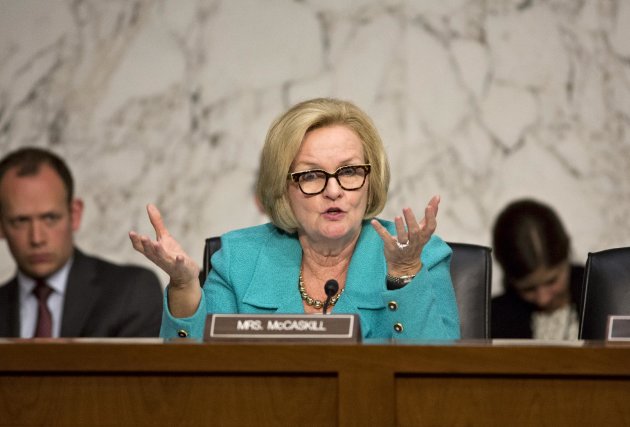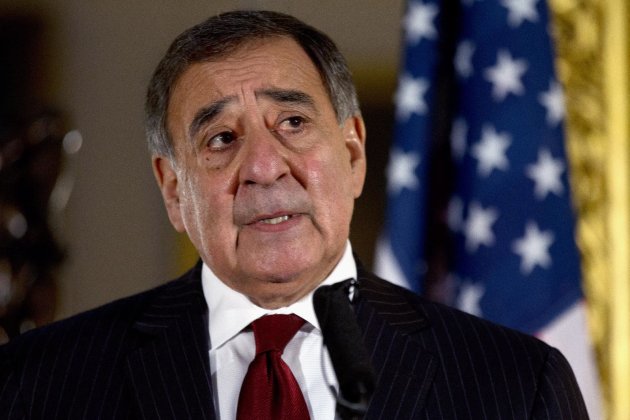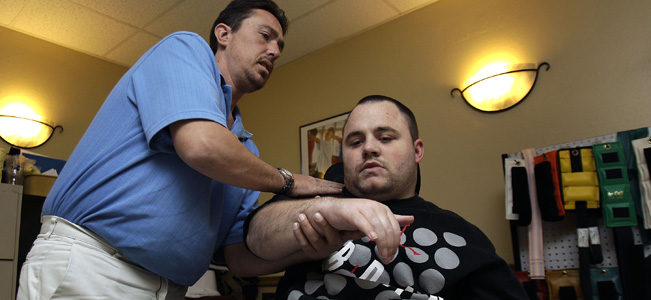The report was released Tuesday and comes just days after the Air Force's head of sexual assault prevention was arrested on charges of groping a woman in a Northern Virginia parking lot. And it follows a heated debate over whether commanders should be stripped of the authority to overturn military jury verdicts, such as one officer did in a recent sexual assault conviction.
"I don't want just more speeches or awareness programs or training, or ultimately folks look the other way," the president said. "We're going to have to not just step up our game, we have to exponentially step up our game to go after this hard."
Hagel later gave a grim assessment, saying the military "may be nearing a stage where the frequency of this crime and the perception that there is tolerance of it could very well undermine our ability to effectively carry out the mission and to recruit and retain the good people we need."
The documents show that the number of sexual assaults actually reported by members of the military rose 6 percent to 3,374 in 2012. But a survey of personnel who were not required to reveal their identities showed the number of service members actually assaulted could be as many as 26,000, but they never reported the incidents, officials said Tuesday.
That number is an increase over the 19,000 estimated assaults in 2011.
The statistics highlight the dismal results that military leaders have achieved in their drive to change the culture within the ranks, even as the services redoubled efforts to launch new programs to assist the victims, encourage reporting and increase commanders' vigilance.
Hagel ordered a series of steps and reviews to increase officers' accountability for what happens under their commands, and to inspect workstations for objectionable materials, according to memos and documents obtained by the AP.
"Sexual assault is a crime that is incompatible with military service and has no place in this department," Hagel said in a new response plan the department will release Tuesday.
"It is an affront to the American values we defend, and it is a stain on our honor. DoD needs to be a national leader in combating sexual assault and we will establish an environment of dignity and respect, where sexual assault is not tolerated, condoned, or ignored."
While the latest cases involve Air Force members, the problem extends across all the military services.
Across Capitol Hill, lawmakers demanded the Pentagon take more aggressive steps to address the growing problem and they announced renewed efforts to pass legislation to battle the problem.
"When our best and our brightest put on a uniform and join the United States Armed Forces, they do so with the understanding that they will sacrifice much in the name of defending our country and its people. However, it's unconscionable to think that entertaining unwanted sexual contact from within the ranks is now part of that equation," said Sen. Patty Murray, D-Wash.
"Not only are we subjecting our men and women to this disgusting epidemic, but we're also failing to provide the victims with any meaningful support system once they have fallen victim to these attacks."
Sen. Carl Levin, D-Mich., told Air Force officials at a Senate Armed Services Committee hearing on Tuesday that "while under our legal system everyone is innocent until proven guilty, this arrest speaks volumes about the status and effectiveness of (the Defense) department's efforts to address the plague of sexual assaults in the military."
Rep. Mike Turner, R-Ohio, Sen. Kirsten Gillibrand, D-N.Y., and others are drawing up legislation that likely will be included in the annual defense policy bill that will essentially strip military officers of the authority to overturn convictions for serious offenses such as sexual assault.
Separately, Murray and Sen. Kelly Ayotte, R-N.H., introduced legislation on Tuesday to provide victims with a special military lawyer who would assist them throughout the process, prohibit sexual contact between instructors and trainees during and within 30 days of completion of basic training or its equivalent and ensure that sexual assault response coordinators are available to help members of the National Guard and reserve.
Turner said the increase in assaults and the failure of so many victims to come forward shows that "much more needs to be done both legislatively and structurally, to root out this problem."
According to Pentagon documents, the key conclusion of the report is that "sexual assault is a persistent problem in the military and remains vastly underreported."
The report says that of the 1.4 million active duty personnel, 6.1 percent of active duty women — or 12,100 — say they experienced unwanted sexual contact in 2012, a sharp increase over the 8,600 who said that in 2010. For men, the number increased from 10,700 to 13,900. A majority of the offenders were military members or Defense Department civilians or contractors, the report said.
Within the specific services, the Army showed a 16 percent decrease in the number of reported sexual assault cases, from 1,695 in 2011 to 1,423 in 2012.
Military and defense officials said to a degree they view an increase in reporting as a somewhat positive move since it indicates that victims are becoming more willing to come forward and have faith in the military justice system.
Gen. Mark Welsh, the Air Force's chief of staff, told the Senate Armed Services Committee that he and Air Force Secretary Michael Donley were "appalled" by the charges against Krusinski.
"As we have both said over and over and over again, sexual assault prevention and response efforts are critically important to us," Welsh said. "It is unacceptable that this occurs anywhere, at any time, in our Air Force."
Welsh said that while the Krusinski case is being adjudicated by the Arlington County, Va., prosecutor, the Air Force has requested jurisdiction. He said Krusinski will be arraigned Thursday on one count of sexual battery and that an Arlington County prosecutor will decide the jurisdiction question.
Sen. Claire McCaskill, D-Mo., one of the most vocal critics of the military's efforts to stop sexual assaults, pressed Welsh on what qualifications Krusinski had for the job and whether Welsh reviewed his personnel file since his arrest to see if there were any red flags.
Welsh said he found nothing irregular in Krusinski's file.
___
Associated Press writer Richard Lardner contributed to this report.
___
Follow Lolita C. Baldor at https://twitter.com/lbaldor
Follow Donna Cassata at http://twitter.com/DonnaCassataAP






